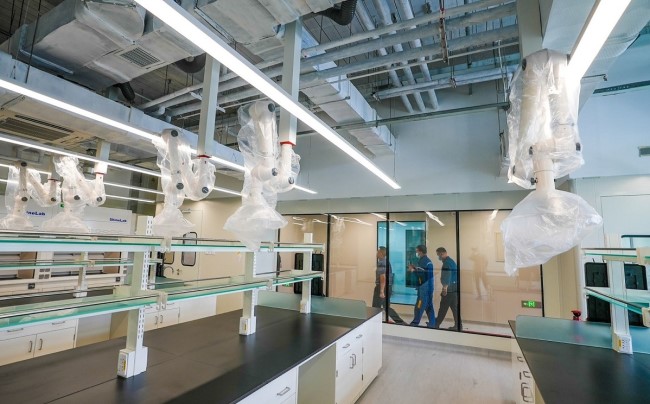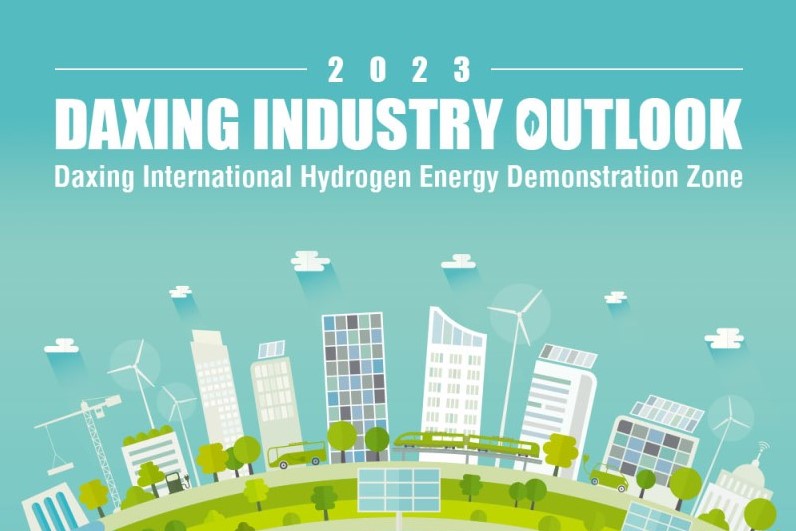Daxing biopharma cluster showcases country's industrial transformation

A medical incubation platform is put into operation in Beijing Daxing International Airport Economic Zone, in September 2022. [Photo/Beijing Daily]
With government support, Beijing Daxing International Airport Economic Zone is building itself into a major life and health sciences industrial cluster to help propel the country's biopharmaceutical development.
The economic zone started its construction in September 2019 and covers some 150 square kilometers. By the end of July, registered enterprises in the zone reached 2,961, including 53 foreign companies.
In the life and health sciences sector, there were 231 registered enterprises and eight under-construction projects. Highlights include projects from State Key Laboratory of Peking Union Medical College Hospital, cell therapy leader Shanghai Cell Therapy Group Co Ltd and Beijing-based stem cell researcher AegleStem Therapeutic.
Li Chengping, an analyst at online healthcare service platform VBData.cn, said that one of the reasons for the fast realization of such a dense population of enterprises was its geographical advantage. The zone captures the overflow effect from Beijing Daxing International Airport, whose annual passenger count and cargo throughput are estimated to reach 72 million trips and 2 million metric tons by 2025, he said.
"In addition, the zone enjoys a high-net-worth consumer base and nearby stocks of high-end goods, laying a solid foundation for building a high-level life and health sciences industrial cluster," Li said.
He added that it is common for biopharmaceutical companies to settle in airport zones, given that they have unique supply needs such as refrigerated biological materials which are high-value and time-and-temperature sensitive.
In addition, Beijing Daxing International Airport's dense passenger routes make the nearby areas suitable for the headquarters of large pharmaceutical companies whose executives fly frequently.
Since the establishment of the airport economic zone, the city government has delegated 178 administrative policies to local administrative bodies in Daxing, simplifying bureaucratic procedures such as approval of new enterprises.
Chang Yongkuan, head of Roche China's medical incubator project, said that long-term continuity in policymaking will give companies the confidence to settle in the zone permanently.
"This is vital to maintaining constant, high-quality innovation in biological medicine. In addition, it is expected that the government comprehensively allocates resources so as to help enterprises attract, maintain and make good use of talent," Chang said.
Zhu Yi, CEO of Hillgene Biopharmaceutical Co Ltd, a Suzhou-based pharmaceutical company, agreed, saying that his company prioritized access to and retainment of talent.
Li Gen, deputy director of Daxing's Investment Promotion Center, said that in 2021, the gross domestic product of the district rose 60 percent year-on-year to 149.3 billion yuan ($21 billion). He added that the growth rate was 48.6 percentage points higher than the city's average, thanks to policy support, industrial upgrading and the strong regional transportation network.
Chen Jia, an independent researcher in international strategy, is optimistic about the development of China's pharmaceutical and biotech industries.
He said that the airport economic zone in Daxing, which has both logistical advantages and a high concentration of resources, expertise, technology and policy support, is destined to drive a "blowout" transformation of the area into a large-scale, high-tech life and health sciences industrial cluster.
He urged the zone to continue importing high-quality R&D resources from abroad while developing local innovation capacity in order to realize its promising prospects, which are predicted to spill over into connected industries and the wider Daxing region.

